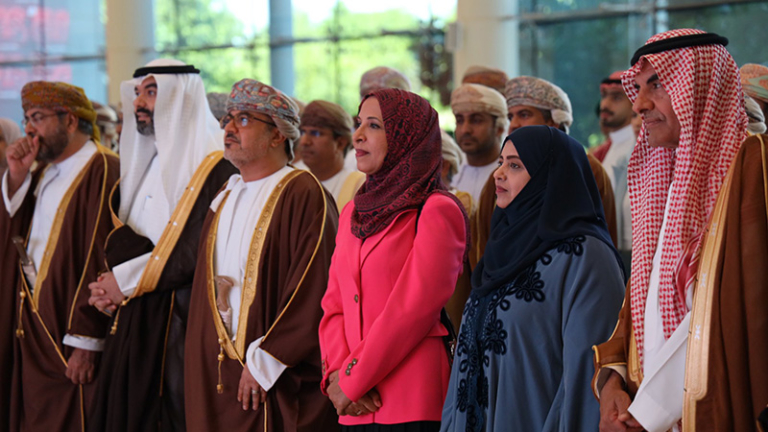
Oman is making gradual progress in the area of women’s rights. Women in Oman are voting, running for office, and serving in ministerial positions. Opportunities in higher education are on the rise, with women making up over 50 percent of university students, and opportunities for participation in the workforce are growing as well. Women have also seen legal advances in the last two decades to secure their rights, including the establishment of universal suffrage in 2003, the ratification of the Convention on the Elimination of All Forms of Discrimination against Women (CEDAW) in 2006, and a 2008 royal decree granting them the same rights as men regarding land ownership.
But despite this progress, women in Oman continue to face barriers to full-fledged participation in public life, as well as restrictions in the legal, economic, and political domains. Women are underrepresented in politics, with tribalism and patriarchal structures working to constrain the success of women candidates. Discriminatory laws still prevent them from exercising the same economic and social rights as men. And the uneven impacts of urbanization have resulted in challenges for women in rural areas, including greater social restrictions and less access to government resources.
Indeed, women’s progress in Oman has stalled in recent years as the government instead prioritizes economic development. The Omani government has focused its attention and resources on addressing urgent economic challenges under the leadership of Sultan Haitham bin Tariq Al Said, who succeeded Sultan Qaboos bin Said Al Said following his death in 2020.
In order to ensure that women are fully integrated into the country’s efforts to boost economic development, the Omani government should implement policies that facilitate women’s leadership in politics and that are more inclusive of rural women.
Women’s Progress
Women throughout the Gulf states witnessed rapid shifts in their societal roles during the 1970s. Modernization projects targeted both men and women as governments sought to harness the power of human capital for development. Gulf citizens benefited from workforce nationalization policies and the establishment of government scholarship programs, as well as the founding of new schools and universities.
In Oman, the late Sultan Qaboos made women’s issues a major focus of the country’s development plans. Women gained the right to vote and run for office as early as 1994, before their counterparts in other Gulf Arab states. And Oman’s Basic Law, issued in 1996, prohibits gender discrimination. In addition, the development of a public education system for girls and boys in the 1970s, alongside the establishment of literacy centers, allowed women to receive an education for the first time.
In Oman, the late Sultan Qaboos made women’s issues a major focus of the country’s development plans.
Women’s organizations were established across the Gulf, coming as early as the 1950s in Kuwait, and in 1972 in Oman, when the country’s first women’s organization was founded. These organizations are significant for women’s advancement, as they provide a space to discuss important social issues and play a role in encouraging participation in development. Many women candidates in Oman’s most recent election, for example, were members of a women’s organization. However, while Oman has more than 60 women’s organizations, all civil society organizations are closely monitored by the government and are thus restricted from advocating for women’s rights on their own terms.
Rates of higher education enrollment and workforce participation among women in Oman have risen significantly over the past few decades, as they have in other Gulf Arab states. Women’s illiteracy rates decreased from 85 percent in 1970 to 5.2 percent in 2020. According to recent statistics, the rate of women’s enrollment in higher education in Oman was 57 percent as of 2020, which is close to Qatar and the UAE’s respective rates of 59 and 66 percent. However, the rate of women’s labor force participation in Oman, at 29 percent, is lower than other Gulf Arab states, where women’s participation ranges between 31 and 57 percent. Regardless, it is still higher than many countries in the Arab world.
Women comprise 42 percent of the public sector workforce in Oman, with many working in administrative government positions. Women outnumber men in service industries like healthcare, education, and social work. Many work in the retail sector, and they also make up 88 percent of the country’s craftspeople. Women in Oman are also leading the way in entrepreneurship, with more women than men now running their own businesses.
Gender Discrimination
Despite notable progress, Omani women still face barriers to workforce participation that are shared by women across the Gulf. These include conservative social norms, the pressure to prioritize marriage and childbearing, and private sector policies that are unfriendly to working mothers. Patriarchal tribal structures and values also impact women’s level of mobility, with those from more traditional tribes facing greater restrictions.
Despite notable progress, Omani women still face barriers to workforce participation that are shared by women across the Gulf. These include conservative social norms, the pressure to prioritize marriage and childbearing, and private sector policies.
Women in rural areas in Oman face additional constraints on workforce participation, including cultural and economic barriers to mobility, and more conservative social norms. They also face unique struggles in starting their own businesses, such as their location and their limited access to resources and support, including access to information, funding, technology, and training.
Women in Oman are also restricted by discriminatory patriarchal laws. For example, although the government ratified the CEDAW in 2006, it maintained its reservations to certain articles that contradict the country’s nationality and personal status laws. For example, according to Oman’s nationality laws, Omani women who are married to non-Omani men cannot automatically pass their citizenship on to their children. In addition, their husbands must live in Oman for 15 years before being able to apply for nationality, compared to 10 years for non-Omani wives of Omani men.
Meanwhile, Oman’s personal status laws discriminate against women in the areas of marriage, divorce, and inheritance. With the exception of Saudi Arabia, all of the Gulf Arab states have codified their personal status laws, which were modeled after a document issued by the Gulf Cooperation Council in 1997 and based in principles of Islamic law.
Under Oman’s personal status laws, women need the permission of a male relative or guardian in order to marry. While men can obtain a divorce without cause, women must prove that there was a case of abandonment or a failure to provide financial support if they want a divorce. The other option available to women seeking a divorce is to pay compensation for the husband’s consent, a process called khula. Women also receive half the inheritance that men do and have greater difficulty in acquiring legal guardianship over their children.
Oman’s personal status laws grant women the right not to be physically or emotionally abused by their husbands. However, marital rape is not criminalized by Oman’s penal code, and women who report rape can be charged with having sexual relations outside of marriage if they do not win their case.
Other Gulf Arab states have similar laws restricting women’s rights in these diverse areas, including some that enact additional restrictions. For example, personal status laws in Bahrain, Qatar, and Kuwait include provisions allowing men to stop their wives from working under certain circumstances.
Women’s Political Participation
As the first Gulf Arab nation to grant women the right to vote and run for office, Oman has a long history of women’s political participation. Women have also been appointed to ministerial positions, with Oman’s first woman minister having been appointed in 2004 as the minister of higher education. However, women in Oman remain severely underrepresented in political decision-making roles.
Furthermore, women candidates have seen limited success in the country’s elections. Oman’s Shura Council is the only elected legislative assembly in the country, and only two women were elected to the 86-member council in 2019. However, the number of women candidates doubled between the 2015 and 2019 elections, and seven women were elected to the country’s municipal council in the 2016 municipal elections.
Tribal politics and cultural perceptions constitute the main barriers to women candidates’ success. Tribes are an influential force in Omani politics, with tribal blocs informally nominating candidates and with many Omanis voting along tribal lines. Informal tribal structures also prevent more women from running for office, because they cannot participate in tribal forums where political discussions take place. In addition, it is rare for women to receive tribal support to run for office due to conservative social norms, making it more difficult for women candidates to organize an effective campaign.
Negative social perceptions regarding women’s political participation further impede the success of women candidates. Those who are elected are often forced to face public scrutiny and a lack of cooperation from male officials.
Negative social perceptions regarding women’s political participation further impede the success of women candidates. Those who are elected are often forced to face public scrutiny and a lack of cooperation from male officials. Women candidates in Kuwait and Qatar have faced the same issues with similar results. Last year, Qatar’s emir appointed two women to the country’s Shura Council after no women candidates were elected in the first legislative election. None of the 29 women candidates running for office in Kuwait in 2021 were elected, though two were elected in 2022. Fortunately, Kuwaiti women gained access to traditionally men-only public forums called diwaniyas during elections in the past few years, with some women candidates holding forums of their own. And a Kuwaiti activist launched an online platform to support women candidates, helping them gain greater exposure.
While Oman’s women candidates could certainly benefit from similar measures, top-down action has been a more effective means of getting women into political leadership roles in the Gulf. Across the Gulf, the merit of introducing political quotas has been debated, with proponents arguing that society will follow governments’ lead.
Integrating Women into Social and Economic Development
As the Omani government institutes important measures to boost and diversify the economy, some of the country’s women citizens are being left behind. Without more women in decision-making roles and without more inclusive government programs, women’s economic and social progress will remain at a standstill.
Oman led the way in the region in granting women the right to vote, and did so by way of decree. The same direct action is now needed to further advance women’s political participation. The Omani government should take an active role in getting more women into decision-making roles, including through appointments and quotas, which will encourage broader societal change.
Affording greater autonomy to women’s organizations in Oman could also benefit women’s political awareness and positively impact social perceptions of their roles in society. The government should also develop programs and policies that address the unique restrictions women in rural areas face. Oman has recently taken steps toward this end, including creating an online platform to promote and sell products made by women entrepreneurs from rural areas. The government should continue supporting rural women’s efforts to join the workforce and start their own businesses.
The Omani government should also reform its personal status and nationality laws to fully conform to the CEDAW so that women no longer face legal restrictions to their full participation in society. Omani women should be given the authority to advocate for their rights as they see fit, and to lead government efforts to better integrate themselves into the country’s economic and social development. Such changes will only further Oman’s social and economic progress, which cannot move forward without the advancement of women’s status in politics and society.
Featured image credit: Twitter/Omani Ministry of Higher Education

